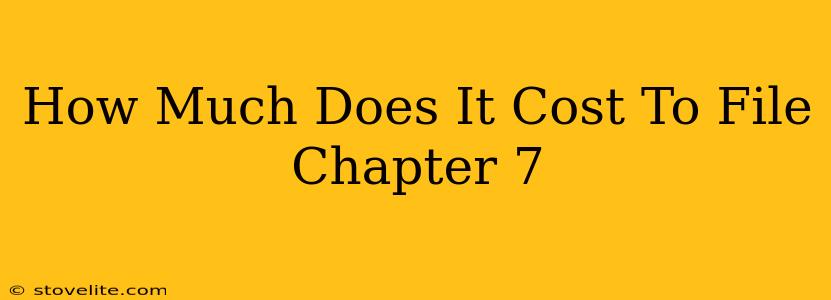Filing for Chapter 7 bankruptcy can feel overwhelming, and understanding the associated costs is a crucial first step. This isn't a one-size-fits-all answer, as the total expense depends on several factors. This guide breaks down the potential costs to help you budget effectively.
The Core Costs of Chapter 7 Bankruptcy
The primary expenses you'll encounter when filing for Chapter 7 bankruptcy include:
1. Attorney Fees:
This is often the biggest expense. Attorney fees vary significantly based on factors such as:
- Your attorney's experience and location: Experienced bankruptcy attorneys in high-cost-of-living areas will naturally charge more.
- Complexity of your case: A simple Chapter 7 filing with straightforward assets and debts will cost less than a complex case involving significant assets, multiple creditors, or legal disputes.
- Hourly rate vs. flat fee: Some attorneys charge hourly, while others offer flat fees. A flat fee provides more predictable costs, but it might not be suitable for complex cases.
Expect to pay anywhere from $1,000 to $4,000 or more for attorney fees. Getting quotes from multiple attorneys is highly recommended to find the best fit for your budget and needs. Don't hesitate to ask about payment plans.
2. Court Filing Fees:
You'll need to pay a filing fee to the bankruptcy court. This fee is set by the federal government and is currently around $335. This amount can vary slightly by jurisdiction, so confirm the exact fee with your attorney or the court directly.
3. Other Potential Expenses:
While less common, you might incur additional costs, including:
- Credit counseling: You're required to complete credit counseling before filing. The cost typically ranges from $0 to $75. Some agencies offer sliding-scale fees based on income.
- Debt consolidation: This isn't directly part of Chapter 7 but might be a strategy you consider after bankruptcy to better manage your financial health. Fees vary greatly, but the potential for long-term savings might offset the costs.
- Additional administrative fees: In rare cases, unforeseen administrative fees might arise. These are less predictable and are usually minimal.
Factors Affecting the Total Cost
Several factors can significantly impact the overall cost of your Chapter 7 bankruptcy filing:
- Asset complexity: If you have substantial assets (real estate, valuable possessions, etc.), your attorney will need to spend more time valuing and documenting them, increasing the fees.
- Creditor disputes: If creditors contest your filing, this adds to the complexity and the legal costs.
- Property exemptions: Navigating state property exemption laws can be intricate, potentially increasing your legal expenses.
Finding Affordable Legal Help
Navigating the Chapter 7 process can be challenging, and finding affordable legal assistance is crucial. Consider these strategies:
- Seek referrals: Ask friends, family, or financial advisors for recommendations on reputable bankruptcy attorneys.
- Consult Legal Aid organizations: Legal Aid societies might offer low-cost or pro bono services to those who qualify.
- Utilize online resources: Research attorneys in your area, check reviews, and compare their pricing structures.
Conclusion: Budgeting for Chapter 7
While the cost of Chapter 7 bankruptcy can range significantly, understanding the potential expenses – attorney fees, court filing fees, and other potential costs – allows you to budget effectively. Remember to obtain multiple quotes from attorneys and thoroughly investigate your options to ensure you make informed decisions during this challenging period. Don't hesitate to ask questions and clarify all costs upfront. Getting clear on the finances is a vital step in achieving a successful bankruptcy resolution.

